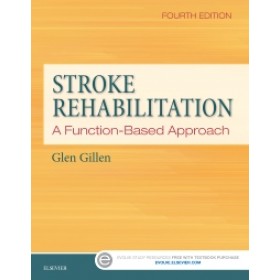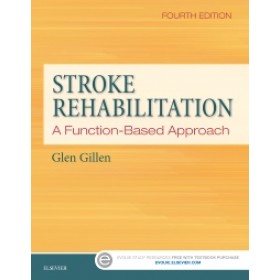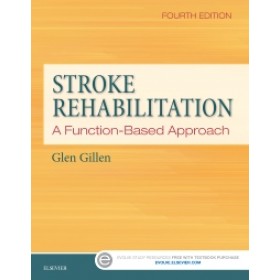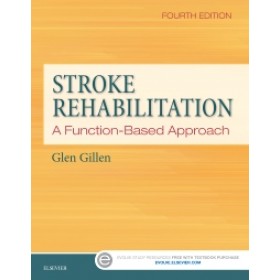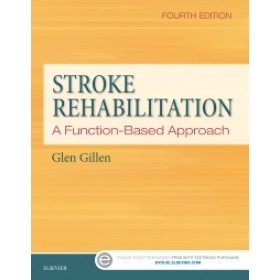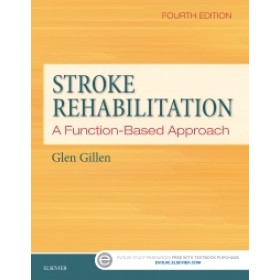Details
Share a Course: Stroke Rehabilitation: A Function-Based Approach, 4th Edition: Module 1 (Electronic Download)
SKU: 781SE
Do you already have access to the reading materials and only need the testing materials? Are you planning to Share A Course with someone else who already has the reading materials?
These courses are offered in cooperation with Elsevier Health and utilize the hardback textbook, “Stroke Rehabilitation: A Function-Based Approach, 4th Edition” by Glen Gillen, EdD, OTR, FAOTA.
Learn to confidently manage the growing number of stroke rehabilitation clients with these exciting new courses! Using a holistic and multidisciplinary approach, this text remains the only comprehensive, evidence-based stroke rehabilitation resource for occupational therapists. The new edition has been extensively updated with the latest research in assessment and intervention, along with more evidence-based research added to every chapter. As with previous editions, this comprehensive reference uses an application-based method that integrates background medical information, samples of functionally based evaluations, and current treatment techniques and intervention strategies.
Module 1: covers pathophysiology, medical management and acute rehabilitation of stroke survivors, psychological aspects of stroke rehabilitation and improving participation and quality of live through occupation.
Module 2: covers the task-orientated approach, activity-based interventions in stroke rehabilitation and approaches to motor control dysfunction.
Module 3: covers trunk control, balance impairments and vestibular rehabilitation when performing stroke rehabilitation.
Module 4: covers upper extremity function and management and rehabilitation technologies to promote upper limb recovery after a stroke.
Module 5: covers edema control, splinting applications and functional mobility after a stroke.
Module 6: covers gait awareness, managing visual and visuospatial impairments to optimize function in patient who have had strokes and the impact of neurobehavioral deficits on activities of daily living.
Module 7: covers enhancing the performance of activities of daily living after a stroke, the treatment of cognitive-perceptual deficits using a function-based approach and managing speech and language deficits after a stroke.
Module 8: covers driving and community mobility as an instrumental activity of daily living, parenting after stroke, dysphagia management and sexual function and intimacy after a stroke.
Module 9 covers adaptations for activities of daily living, leisure activity participation after stroke, seating and wheeled mobility prescription and home evaluation and modifications for stroke patients.
Order this product and it will be available to you immediately after purchase for electronic download in the “My Downloads” section of your account after you have logged in. The download files will require Adobe Acrobat Reader to open. If you do not have Adobe Acrobat installed, you may download it at no charge from Adobe.com.
Course Length: 8.0 contact hours
Instructional Level: Intermediate
This package includes only the testing materials for Module 1 and NOT the required reading materials.
Stroke Rehabilitation: A Function-Based Approach, 4th Edition: Module 1
Course Goals and Objectives:
Course Goals: This course is intended to instruct the student, through self-paced study, on the pathophysiology, medical management and acute rehabilitation of stroke survivors, psychological aspects of stroke rehabilitation and how to improve participation and quality of life through occupation.
Student Objectives:
At the end of this course, the student will be able to:
1. Relate the pathophysiology of stroke
2. Analyze the diagnostic workup of stroke survivors
3. Discriminate between the medical management of various stroke syndromes
4. Distinguish interventions to prevent the recurrence of stroke and its complications
5. Differentiate normal and abnormal responses to acute stroke rehabilitation
6. Distinguish standardized assessments used during acute stroke rehabilitation
7. Outline a comprehensive treatment that is safe for the acute and ICU settings
8. Distinguish between appropriate and not-appropriate goals for the acute and ICU settings
9. Relate how to prevent secondary complications such as skin breakdown and contractures after a stroke
10. Distinguish between the psychological manifestations of stroke in both children and adults
11. Relate how a variety of psychological impairments affect the recovery process
12. Distinguish how different personality traits impact rehabilitation
13. Relate the effect of stroke on family members and those in the caregiver role
14. Outline the importance of participation in recovery
15. Distinguish key concepts of participation, occupation and quality of life in stroke
16. Distinguish key measures therapists can use to address participation, occupation, and quality of life in practice
17. Analyze participation in the continuum of care from the acute episode to community reintegration
18. Outline barriers that threaten participation and quality of life
19. Identify the key role that therapists have in fostering participation through occupation
